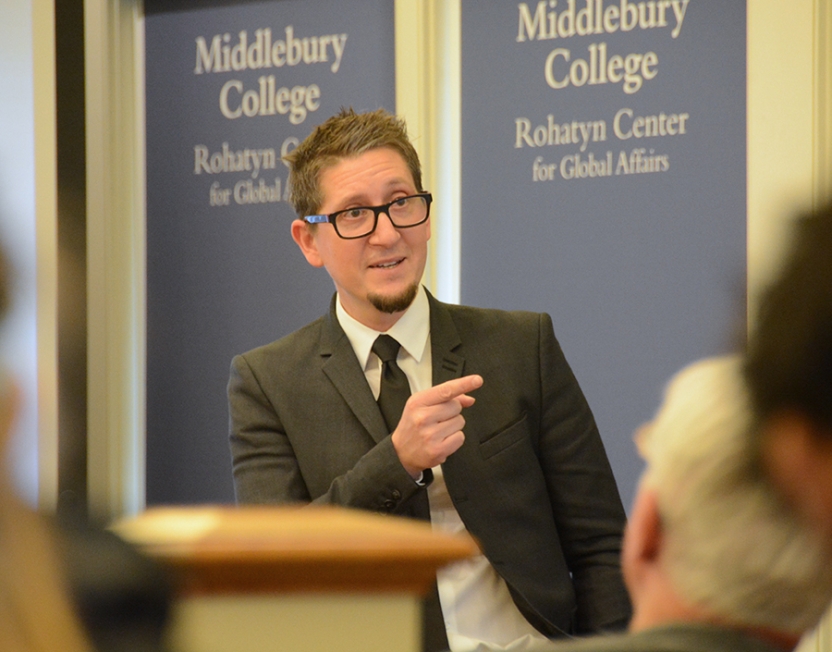Symposium Delves into Illicit Drug Trade

MIDDLEBURY, Vt. — Four experts presented their views on “The Global Illicit Drug Trade: Confronting Challenges and Exploring Solutions” at the fifth annual International Politics and Economics Symposium on October 28 at the Robert A. Jones ’59 House.
Will Pyle, the director of Middlebury’s program in international politics and economics, introduced the day’s proceedings and said the symposium would explore whether “institutions designed to disrupt the flow, production, and consumption of illicit drugs have been effective.” The Frederick C. Dirks Professor of International Economics said the gathering would also examine the cost and effectiveness of illicit drug policies, and offer ideas and innovations “that might offer a better path forward.”
Middlebury’s Rebecca Tiger, an associate professor of sociology, spoke on “(Re) Imagining Drugs and Addiction: The Past, Present, and Possible Future of Drug Policy”; Peter Reuter, professor of public policy and criminology at the University of Maryland, delivered a talk titled “The International Drug Policy Reform Agenda: Why It Misses the Major Problems and Opportunities”; and Alexandro Madrazo Lajous, a senior researcher with Mexico’s Centro de Investigación y Docencia Económicas, presented “The Constitutional Costs of the War on Drugs.”
The symposium’s fourth speaker, policy researcher Beau Kilmer of the RAND Corporation and coauthor of the book Marijuana Legalization: What Everyone Needs to Know (Oxford University Press, 2012), brought the conversation home to Vermont with his presentation titled “Marijuana Legalization 2016: Assessing the International Policy Landscape and Implementation Issues.”
The Vermont Senate in 2016 voted to legalize retail sales of marijuana but the Statehouse overwhelmingly defeated the bill by a vote of 121 against to 28 in favor, said Kilmer.
“One of the arguments [the Associated Press] heard repeated was that legislators were actually in favor of reform—they wanted some type of legalization—but they weren’t necessarily excited about creating this type of commercial market in Vermont,” Kilmer explained, despite the fact there was “a lot of support [for legalization] from the governor, senators, and other public officials.”
Kilmer said Vermont will bear watching in the near future because there are several “alternative models” to cannabis legalization. Colorado, Washington state, Washington, D.C., and Alaska have legalized marijuana growth, distribution, and/or possession to varying degrees, and five states—Arizona, California, Maine, Massachusetts, and Nevada—have ballot measures this year.
Laws in the U.S. and other countries have softened in recent years, Kilmer said, yet the legalization of marijuana continues to be a highly controversial topic.
The pro-cannabis side argues that legalization will increase government revenue through taxation, decrease black market activity, make criminal justice resources more freely available, reduce police contact with the populace, and prevent marijuana users from getting a criminal record, Kilmer explained.
The anti-cannabis side contends that legalization will increase marijuana use among young people and lead to clinical disorders, result in more instances of drugged driving, and increase emergency room visits, and could be correlated with other negative outcomes. In addition, Kilmer said, little is known about the effects of new products derived from the chemicals in marijuana, such as edibles, elixirs, patches, and extracts such as hash oil or “shatter.”
Recent findings indicate the legal-marijuana market is headed in the direction of regulating the level of THC (tetrahydrocannabinol) in products, Kilmer said.
The guest speaker from the Rand Corporation addressed the issue of federal regulations that outlaw marijuana production, sales, and possession, and what the Justice Department is doing (or not doing) about it. He also touched upon how legalization is progressing in Uruguay, Jamaica, Canada, New Zealand, the Netherlands, and other countries.
Kilmer pointed out “10 P’s” that should be taken into account before any jurisdiction considers marijuana legalization: production, profit motive, promotion, prevention and treatment, policing and enforcement, penalties, potency, purity, price, and permanency, and he offered that they are “a good place to start for those who want to engage in debate, design, and analysis” of marijuana legalization.
The International Politics and Economics Symposium was livestreamed to the Middlebury Institute of International Studies at Monterey and to web users everywhere. It was sponsored by Academic Affairs, the Departments of Political Science and Sociology and Anthropology, and the programs in European studies, Latin American studies, and international politics and economics. Other sponsors included: the Center for the Comparative Study of Race and Ethnicity, the minor in global health, the Jones Economic Enrichment Fund, the Pre-Law Fund, and the Rohatyn Center for Global Affairs.
